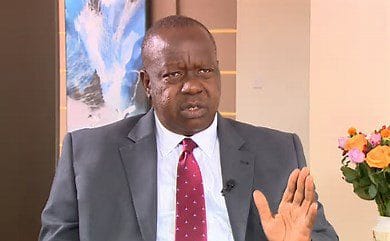Former Interior Cabinet Secretary Dr. Fred Matiang’i has denied any involvement in the alleged cover-up of the 2021 River Yala killings, stating that investigations into the deaths were still ongoing when he left office and urging the government to pursue a public inquest to uncover the truth.
Speaking in an interview with Citizen TV on Tuesday night, Matiang’i described the allegations against him as politically driven and compared them to blaming him for unrelated crimes committed during his tenure.
“If I were responsible for a crime committed by a police officer when I was Interior Minister, then I’m responsible for all road accidents, all robberies with violence… It’s just not possible,” he said.
In 2021, over 36 decomposed bodies were recovered from River Yala, with reports from the International Justice Mission (IJM) and human rights groups indicating signs of torture and extrajudicial execution. The victims were found in sacks, sewn shut, or with plastic bags over their heads—fueling public outrage and calls for justice.
Matiang’i, however, said the discovery led to immediate directives from top security officials for an investigation and a formal inquest.
“The gravity of the situation was such that the DCI himself should go to that place and find out what’s happening. When they came back, we asked for an inquest at the National Security Council,” he noted.
He said the process included tracing families, collecting statements, and compiling a case file—adding that the file was still open when he exited office.
“It Was a Police Matter”
Matiang’i insisted that as Interior CS, he had no operational control over investigations or prosecutorial decisions and stressed that the case was within the police and Directorate of Criminal Investigations (DCI) docket.
“I didn’t leave with the file. I would have nothing to do with it. That was a police matter. The file was open. It wasn’t closed when I left government,” he said.
The former CS also challenged claims that the security agencies knew of the killings in real-time but failed to act.
“Senior police officers wrote statements about the incident. The work was going on to piece everything together. Why hasn’t action been taken since?” he questioned.
He reiterated his willingness to testify in a public inquest and said the way forward must involve accountability through transparent legal processes.
“I’m ready to go before a magistrate or judge—whoever is going to preside over that inquest—and say what I know about it. Throwing stones for political convenience won’t help.”
Chris Msando’s Murder
Matiang’i was also questioned about the unresolved 2017 murder of former IEBC ICT Manager Chris Msando, whose body was discovered days before that year’s general election.
He said he only knew what had been made public and once again called for a public inquest.
“Every time the issue comes up, I say—why don’t we have a public inquest? If anyone has evidence, let them bring it forward.”
He said the DCI consistently claimed that investigations were ongoing and insisted that even as a Cabinet Minister, there was little he could do beyond requesting updates.
“Even if you’re President, there is nothing much you can do if they keep saying, ‘We are following leads.’ What would you do?”
Disbanded SSU and Other Killings
Addressing the controversial disbandment of the Special Service Unit (SSU), which has been linked to the abduction and killing of two Indian nationals and their Kenyan driver in 2022, Matiang’i denied any knowledge of the unit’s operations.
“That was the first time I was hearing about it—when the President asked during our first security briefing. It wasn’t privileged information I had,” he stated.
He stressed that Interior CSs are not briefed on routine police operations, unless they pose a national security risk.
“You cannot be briefed on every single police operation. That’s the job of the IG and their teams.”
On whether he had prior knowledge of the killings of Zulfikar Ahmad Khan, Mohammad Zaid Sami Kidwai, and Nicodemus Muthama, Matiang’i said he only read about the cases in the media.
He added that commenting on active court matters would be inappropriate, noting he had always avoided it while in office.
“Let’s start conclusive investigations on these matters and take action in the direction the investigations point us. Accusing one person today and another tomorrow won’t solve the problem, and it won’t go away,” he said.
Call for Accountability
Matiang’i ended the interview by calling for an overhaul of Kenya’s culture of blame and political scapegoating. He challenged the state to lift the veil on stalled investigations and initiate independent public inquests into unresolved killings, including River Yala and Chris Msando.
“I’m concerned about the very low level of accountability in this country,” he said.
The River Yala case, which has remained unresolved three years later, is still a focal point for civil society organisations calling for justice for victims of enforced disappearances and extrajudicial killings.


